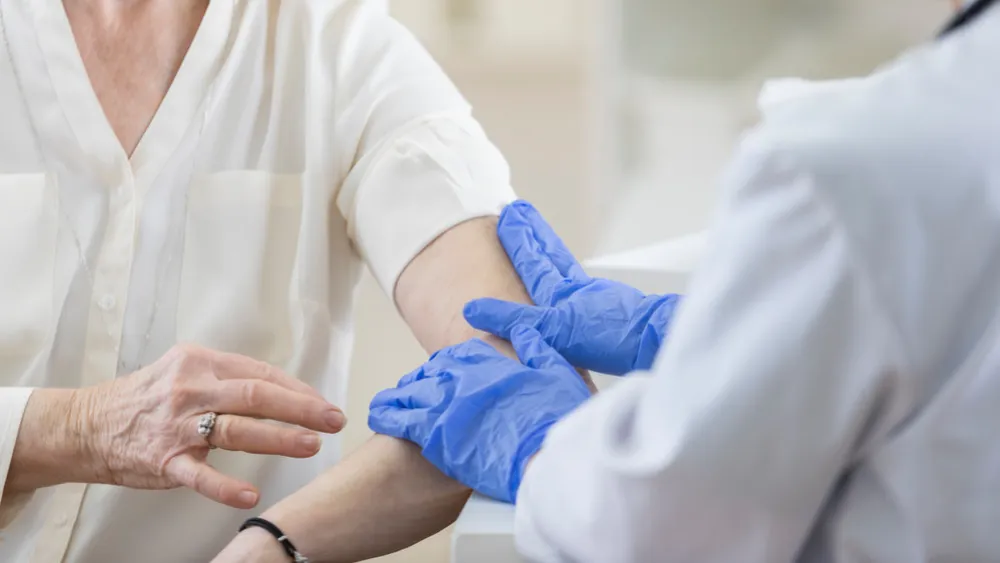Today's Medicine
Here’s Why Adults Over 50 Should Get the Shingles Vaccine
Published: Aug. 4, 2022

While staying up to date on immunizations is critically important for children to remain healthy and thrive, there are a handful of vaccinations older adults should consider – the annual flu shot, the Tdap vaccine and booster, and other vaccines to protect against pneumonia, meningitis and bloodstream infections.
A relatively new vaccine that flies under the radar but is just as important is Shingrix, which protects against shingles. If you’ve ever experienced shingles or talked to someone who has, you know how unpleasant the experience can be.
What Is Shingles?
Shingles is a rash that may be preceded by itching, tingling or pain that’s sharp, aching or burning. The rash can be extremely painful – some people describe it as an intense burning sensation – and usually occurs in a stripe around one side of the body or on the face. The resulting blisters usually scab over in seven to 10 days and clear up in a few weeks. Other symptoms of shingles can include:
- Chills
- Fever
- Headache
- Upset stomach
But for some people, the experience can be worse. About one in 10 people with shingles develop postherpetic neuralgia – nerve pain that can last long after the rash is gone. People with a rash on their face may experience vision loss. And in rare cases, shingles can lead to pneumonia, hearing issues, inflammation of the brain or even death.
How Does Someone Get Shingles?
If you’ve ever had chickenpox – and it’s estimated that 99% of Americans born before 1980 have – you’re at risk to develop shingles. That’s because both conditions are caused by the varicella zoster virus.
After you’ve had chickenpox, the virus stays in your body but goes dormant as your immune system fights back with antibodies – more or less locking it away. However, as your immunity wanes over time, the virus can reactivate and develop into shingles. That risk increases as you age, as does the risk of experiencing serious complications. Currently, about one in three people will develop shingles in their lifetime.
Luckily, there’s an effective two-dose vaccine that can prevent or reduce the severity of shingles.
Common Questions About the Shingles Vaccine
Here are some questions and concerns I frequently hear from patients and families:
Q. Who should get the shingles vaccine?
A. If you’re 50 or older, you should consider the vaccine.
Q. I heard the vaccine’s side effects can be intense. What do I need to know?
A. As with many other viral vaccines, we often see side effects. That’s the vaccine getting your immune system activated and ready to fight for you.
For many people, the shingles vaccine can cause mild pain, redness or swelling at the injection site. Others may have more significant reactions, including headache, muscle aches, fatigue or nausea. Less commonly, people may experience chills or fever. And as with any medication or vaccine given, allergic reactions are possible. That’s why it’s important to have a discussion with your medical team about your situation before making any decisions.
I encourage my patients to get the shingles vaccine when they have a lighter schedule or flexible plans, just in case they experience any of these symptoms.
Q. Can I get shingles from the vaccine?
A. Shingrix is not a live-virus vaccine. It contains a small portion of a protein in the virus to give your immune system a self-defense refresher course. Because it’s not a live-virus vaccine, you cannot get shingles from the vaccine. As unpleasant as any side effects may be, they are proof that your immune system is working. And they’re better than experiencing shingles itself.
Q. I’ve already had shingles. Why do I need the vaccine?
A. Unfortunately, having shingles once doesn’t mean it can’t return. Because the virus lives within you since that childhood infection, it can escape your immune system’s lockdown and cause one or many shingles episodes. Having shingles is proof that your immune system isn’t able to keep the virus well quarantined and could use some help.
Q. I got the previous shingles vaccine, Zostavax, years ago. Why do I need the new vaccine, Shingrix?
A. Zostavax was the best option available at the time. But like so many other things, advances over time have given us better tools. Zostavax was able to reduce your risk for developing shingles by about 50%. Two doses of Shingrix, two to six months apart, reduce your risk by over 95%.
Q. I don’t remember having chickenpox. Do I need the shingles vaccine?
A. You should consider it. You may not remember having chickenpox because you were too young, it was a mild case, or an infected sibling may have exposed you to the virus. Whatever the cause, chickenpox was a nearly universal experience for people born before 1980. So it’s a smart move to get vaccinated and wake up your immune system to give you stronger protection against shingles. And even if you weren’t exposed after all, there are no additional risks to getting the vaccine.
Involve Your Care Team
As with any decision about your health, it’s important to get all the facts and involve your primary care provider. They can help you decide if the shingles vaccine is right for you.
More Resources
- Learn more about the importance of vaccines.
- Struggling to shed the “COVID 15”? Read this.
- Follow Methodist on Facebook, Instagram and Twitter.


